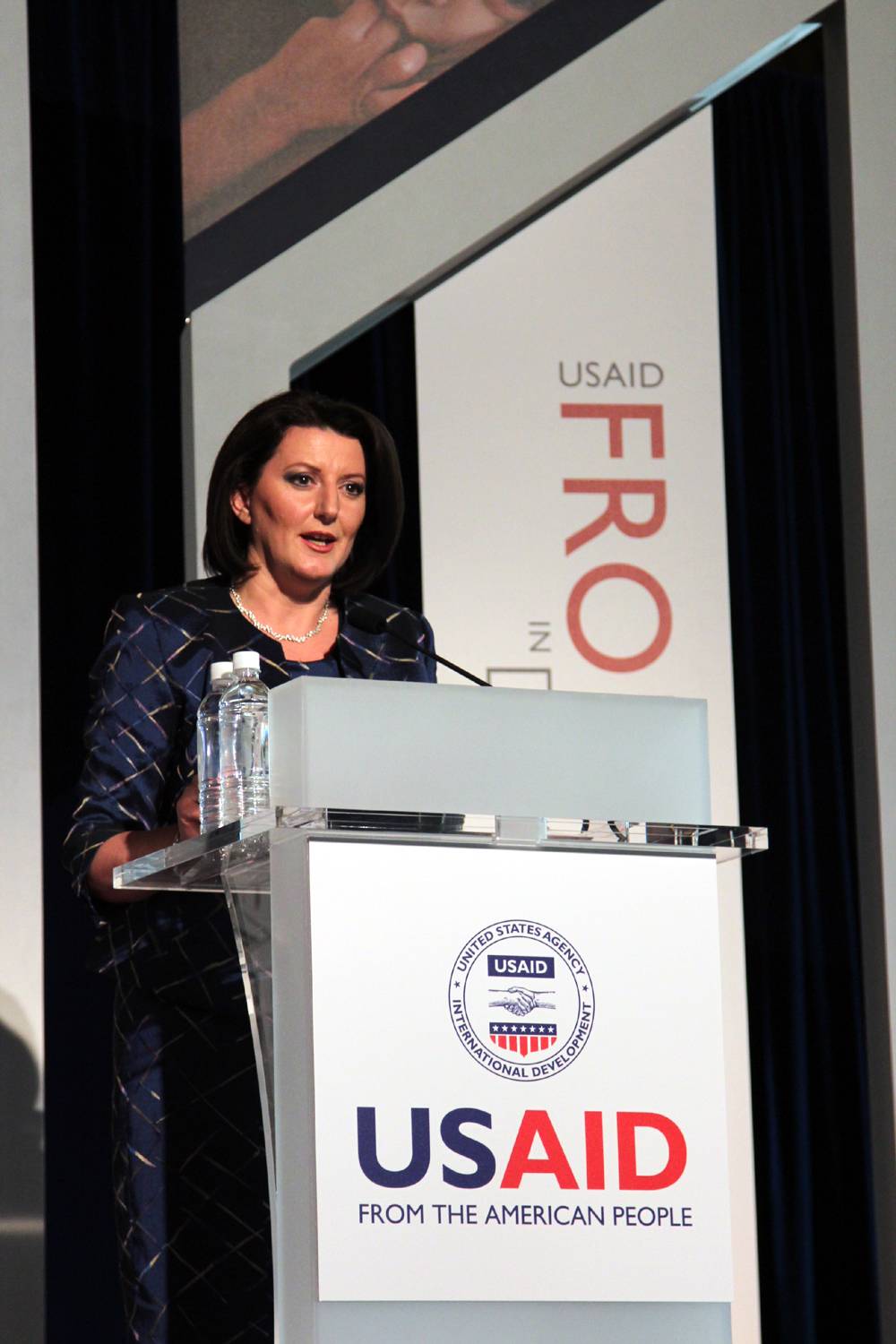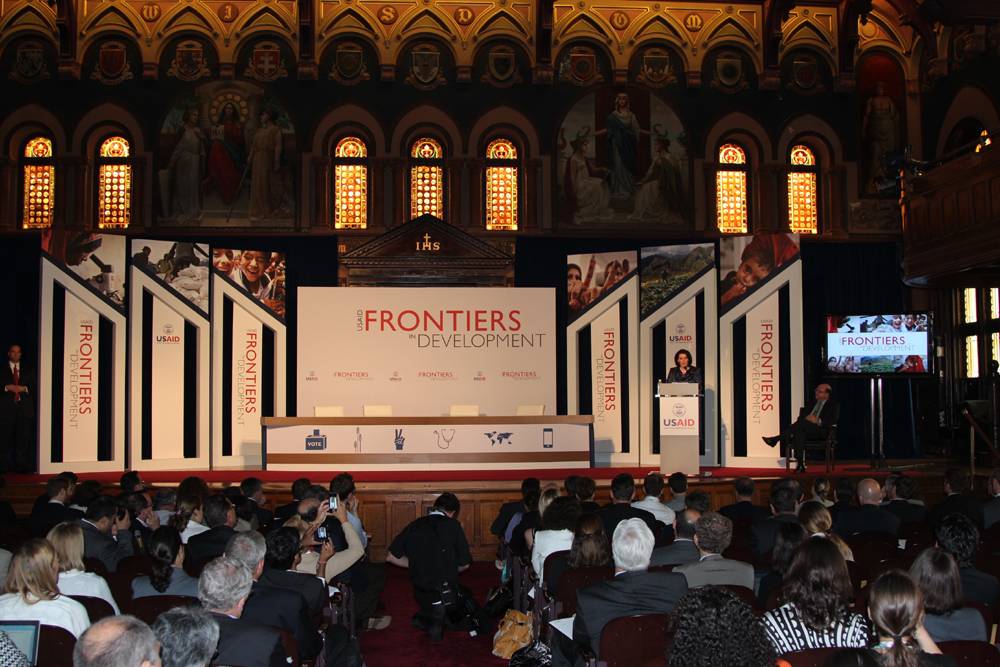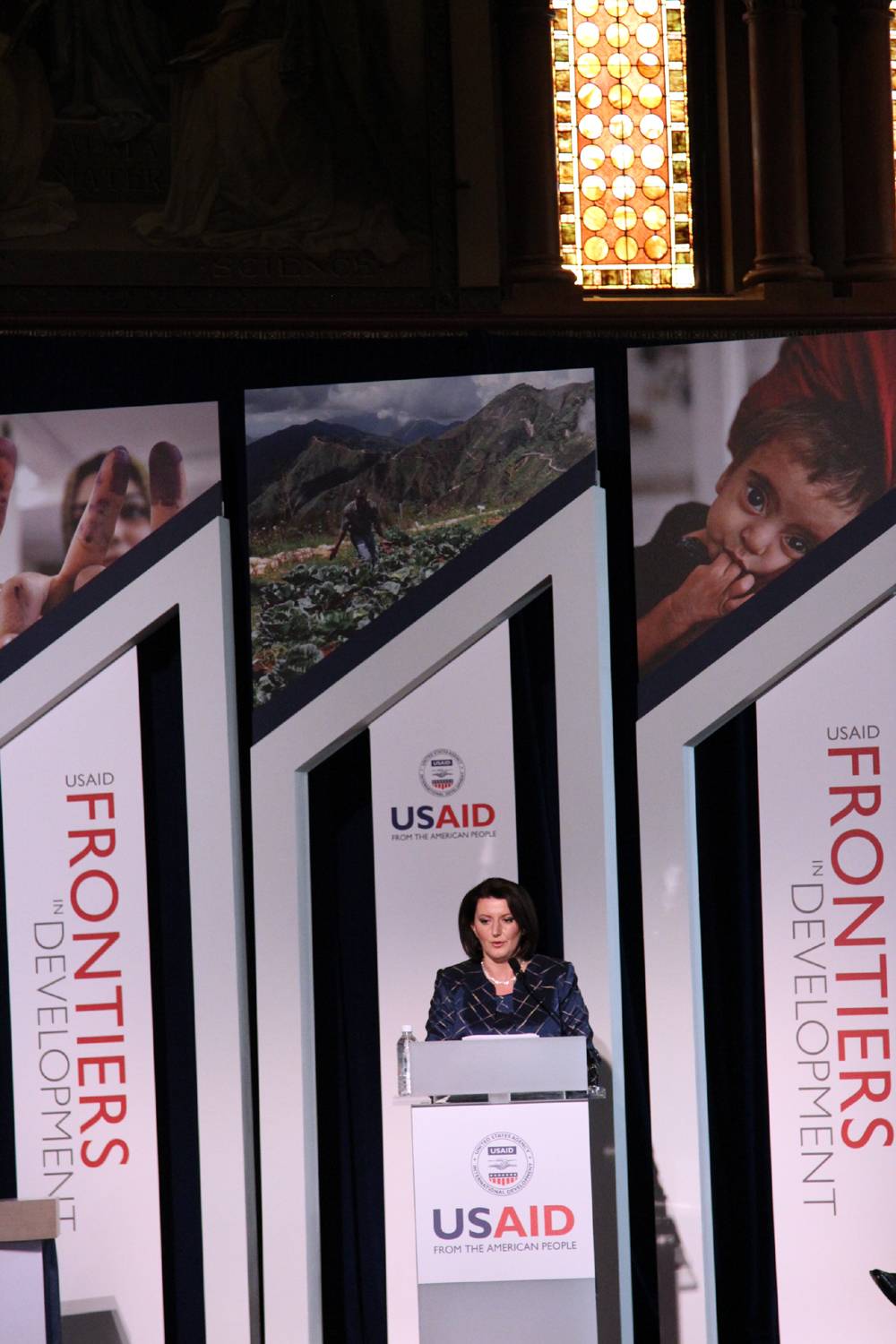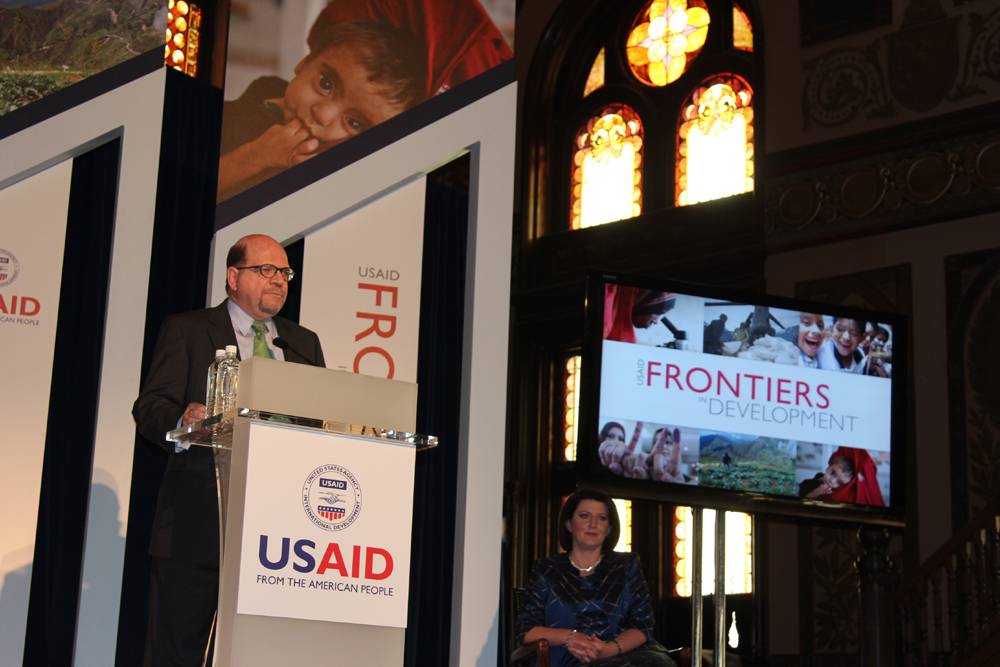Excellencies, honored guests, ladies and gentlemen,
It is my great pleasure to return to Georgetown and to be with you today at this important gathering. In my last visit to Washington in December, I had the honor of joining Secretary Clinton, who has done so much throughout her career and especially in the last four years to make the world a better and a safer place.
I would like to thank Administrator Raj Shah and USAID for hosting this conference and for bringing together so many wonderful, illustrious, and thoughtful people from around the world.
We are here to consider issues that are having a fundamental impact on the lives of people, the fortunes of countries, and indeed the state of the world.
It is fitting that we have this discussion in the United States. A proven democracy that exercises a strong and constructive role in world affairs. And a country that I and the people of Kosovo hold dear–very dear–in our hearts.
As we meet in Washington DC to discuss the Frontiers in Development theme, I pose this question: How can we collaborate to improve the lives of people, and strengthen the material means and moral fabric of societies, while reducing conflicts that produce turmoil, ruin lives, and undermine progress? Our conflicts are numerous and their sources are increasing. Conflicts can be born of ethnic and sectarian strife, political impasse, economic deprivation, or lack of natural resources.
These are large and searching questions. They require answers from virtually every corner of human endeavor. Economic growth, social cohesion, political participation, scientific innovation, and cultural exchange. Collectively, the answers must have vision. They demand wisdom. They call for leadership.
Since I became president of my country a little more than a year ago, I have had the great fortune to represent Kosovo throughout the world and, as is the case here, to meet with people in leadership roles dealing with these large issues that we are all facing: whether we live in Liberia or Kosovo. As you know, Kosovo is Europe’s youngest state in two aspects: having become independent in 2008 and because the average age among its 2 million citizens is twenty-six.
I stand before you as someone whose past was shaped by the conflicts seen repeatedly in the 20th century, the very last of which, in 1999, touched me, my family, our country—directly, and for many tragically.
It was a conflict that never needed to happen. It never should have happened. But it did happen, because of a dictator who had the power to seed distrust and create fear. He was wrong. And he was defeated.
We are left to rebuild, to develop, to remember, and to not repeat the mistakes of the past.
This is my mission, born from the tragedy of the 20th century’s last conflict, inspired by the hope brought forward into this century, and supported by the human spirit residing in all of us.
To succeed, this mission must address the questions I posed earlier. How do we collaborate to improve the lives of people and reduce the opportunities for conflict?
The first answer is to build democracy – through open societies that share information. When there is information, there is enlightenment. When there is debate, there are solutions. When there is no sharing of power, no rule of law, no accountability, there is abuse, corruption, subjugation, and indignation. Where there is no democracy, there is dictatorship. And when there is dictatorship, there is conflict—especially in our globalized, wired age. We have seen this in Egypt and Syria—dictators preside over a false stability that will give way to people’s undeniable desire and right to be free.
When it comes, democracy is a revelation. It’s also complicated. There are elections to hold, politics to create, rights to assert, grievances to settle and institutions to build. Often for the first time, people may speak openly and genuinely. To many it’s exhilarating. For others it can be disappointing, when it turns out that democracy doesn’t immediately make life better.
We must remember that democracy works when given time to develop, mature, and deliver. People must have access to information for informed debate. Government institutions must treat citizens fairly, with dignity, while servicing their needs. Societies must develop not only the confidence to seize freedom, but to act upon it with charity and wisdom. Then democracy works. This is what you know, and this is what I and the people of Kosovo affirm as we moved through our first years as a free and democratic society, learning, adapting, and achieving.
The process of democratization in Kosovo had enormous challenges. The phase of emergency, period of rebuilding and the overall revival was concurrent with efforts to democratize the country. I am proud we have managed to build pluralism and encourage the participation of all Kosovo communities.
As part of the process of building the foundation of our democractic state, we reached out to find the best international practices and to implement them according to Kosovo’s needs. And in reaching out to other citizens of the world, we discovered that what our citizens want is not much different from what all others want in the rest of the world: to hold their leaders accountable, to seek better governance. And for goverment to serve the people rather than people serve the government. And we are exerting our full strengh to meet their expectations.
It is with the same determination that we are trying to mend the differences and remedy the shaken trust which still lingers due to the legacy of the war especially between the Albanian majority and the Serbian minority. And there has been success as Albanian-dominated institutions have extended broad autonomy and legal guarantees for the protection of the rights of the Serbian community as well as their way of life and religious tradition in Kosovo. As a result, the Serbian community in most of Kosovo is fully integrated in the institutional life and in running the day-to-day business in the municipalities where it resides. Recently, in a visit to one such municipality in Shterpce, I had the pleasure of visiting a fair organized by the Serbian women entreprenuers whose main concern were not the ethnic divisions but how to best create an environment that was ripe for business and attractive for foreign investment.
The second answer to meeting the needs of citizens in emergent democracies is economic development. When polls are taken in my country and many others, more than anything else people say they want jobs, a strong economy, good healthcare, sound education and a reliable infrastructure. They want to improve their lives so that their children have more opportunity than they did.
This is what development is about: growing our economies, meeting social demands, and orienting government to serve the public interest. It requires that government have the resources and the policies to unleash the talents of each individual, while doing its best to ensure, with those same resources and policies, fair opportunity for all.
Host-country governments like Kosovo are both partners and beneficiaries of assistance providers. But international community must recognize that development is a balance between the short-term and long-term. It also needs to learn when it is time to end an engagement as well as when to step in because when international assistance goes on for too long or becomes too pervasive, a well-meant intervention can become counterproductive.
At times this dual role of being a partner and a beneficiary can confuse expectations about what governments are supposed to accomplish and, how they can deliver. Go too slow in transferring development responsibilities to local institutions and they can become too reliant. Go too fast and countries may become unstable. Acknowledging this duality is an important element to maximizing development strategies because if a country remains dependent on others to tackle its main priorities it may never develop the ability to do so for itself.
We need to recognize that over time governments, and indeed the private sector and civil society, should assume full responsibility for the development of their countries.
In short, democracy and development go hand-in-hand. Development cannot occur without people having a voice in how their affairs are decided. And democracy cannot take root if people’s basic needs are not met. As my friend, who never ceases to inspire me, Madeleine Albright has said, “People want to eat and to have a say in how they are governed”.
Kosovo’s own development, since the intervention of NATO in 1999, which brought an end to the repression, was remarkable, but also at times slow. It went through different phases. Over one hundred twenty thousand houses destroyed during the war were rebuilt with the help of our international partners, and Kosovo has changed dramatically over a few years, but we contiue to be deeply concerned by the human suffering and the waning of trust between communities.
International assistance in Kosovo was essential to deal with the difficulties of transition and revival. Comprehensive aid in post conflict states is vital. The period of emergency after the war in Kosovo has lasted longer than expected and this has slowed down the development of the country in many areas, making it more dependent on outside aid than anticipated.
This economic and political dependency has at times slowed down Kosovo’s state-building process and consolidation of the country’s political class. Kosovo’s development, however, is a joint success story although the engagement and the role of the local forces should have been more powerful and direct in all the phases of Kosovo’s consolidation.
This fragility has impacted the further development of Kosovo in the area of politics, economics and security. Development and security are tightly linked. Security determines the development of a country. Kosovo had a strong correalation between domestic and international mechanisms of security. NATO’s peacekeeping force, deployed in Kosovo since the end of the war, often has played the role not only of the guardian of Kosovo’s borders with its neighboring countries, but it also helped the communities in Kosovo to facilitate their lives and rebuild the ties between them.
Which brings me to my third answer, to security and inclusion. Societies across the world are rapidly changing as new ways of thinking, new forms of self-expression, evolve. People historically placed on the sidelines by social convention and personal prejudice—concerning gender, race, youth, sexual orientation, and disability–are stepping forward to take their place at the table.
We must make room, for we are all enriched by their inclusion, which breeds security Security is the foundation of the state-building process. Security means economic development and investments. And security guarantees the construction of a strong and respected society. Kosovo is a developing country, which has laid the foundation of a just country, seeking to create equal opportunities for all its citizens. We have built a sound legal system and related mechanisms that guarantee the implementation of the rule of law.
For many years, in my country, the uniform symbolized violence and brutality. But, in the last decade Kosovo has become a country in which its citizens perceive the police force as their own, a force that looks after their security and rule of law regardless of which ethnic community they are serving.
I was part of building this force and am a strong believer that the security of an individual and the security of a community means the security of a whole country. I strongly believe that security forces need to build relations with the community and help the country’s development, prosperity and democratization. Kosovo police has succeeded in this, overcoming a legacy of mistrust that was bred due to a long record of repression by security forces.
Having said that, I also want to point out that my country, like all the countries of the region and those of Southeastern Europe, are confronted with the threat of corruption and organized crime. The perception that Kosovo is a corrupt country with a high rate of organized crime, has at times undermined our efforts to represent our country as a joint – international and local – success story.
As a result, I have decisively taken leadership against corruption, a phenomenon that is destroying the dreams of ordinary citizens for a better future. In this effort, I have established the National Anti-Corruption Council, where I have assembled all the institutions and members of the civil society to find a common solution to combat corruption. I have set priorities and have set the general framework to combat this ill that has plagued Kosovo’s society and I want concrete outcomes.
I am aware that this initiative that I have launched, supported by the society at large and the institutions of the country, will only be able to acheive so much in a short time span. But I have the will to change the course and I stand ready to do it. For the sake of Kosovo and for the sake of Kosovo’s young generations, I have made the fight against corruption the top priority of my time in office. We cannot allow ouselves to waste the opportunity to move forward and seek integration in international mechanisms. And we will not lose this fight.
As to inclusion, I have a special perspective in this regard, being my country’s first female head of state and having climbed up the ranks of a traditionally male profession—the police force. I see the hurdles that many women in Kosovo face: incomplete education, limited economic opportunity, domestic abuse. I know that women the world over confront these problems. As I meet with women across Kosovo, I see the challenges. And I see the passion, the commitment, the drive, and the unity to change things for the better.
We know that, when women take control of their destinies, as mothers, wives, and as citizens, and participate as full members of society alongside men, not only do they find rightful fulfillment, but they make society stronger and government perform better. I look forward to hosting an international conference this fall that will take up these very themes.
To the question then, of how to collaborate to improve people’s lives, strengthen societies, and reduce conflict, I say democracy, development, security and inclusion.
While this conference begins with ideas and vision, it must also fortify us as leaders to inspire the entire world to a better future — A future where democracy is reality, reality is security and the combination results in better lives for all the citizens.
I embrace this role and both offer and ask each of you the support to meet these obligations: confident in our mission, and sure of its success.
I applaud each of you for your efforts, and I thank you for your kind attention.




